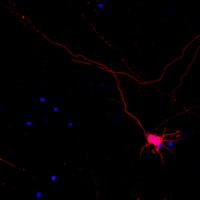Antibodies raised against different oligopeptide segments of human dopamine-beta-hydroxylase.
Nagatsu, I, et al.
Neurosci. Lett., 120: 141-5 (1990)
1990
Show Abstract
We raised antibodies against 3 oligopeptide segments of human dopamine-beta-hydroxylase (hDBH) corresponding to the N-terminal (hDBH-N), the intermediate (hDBH-I), and the C-terminal (hDBH-C) amino acid sequences (residues 26-43, 452-468, and 582-598), respectively. We characterized the antibodies in terms of specificity by means of Western blotting and immunohistochemistry. Anti-hDBH-N antiserum recognized DBH in the brain (noradrenergic neurons in the pons and medulla oblongata) and adrenal medulla, not only of human but also of mouse, rat and house shrew. In contrast, anti-hDBH-C antiserum recognized only human DBH. These observations suggest that the antibody raised against the hDBH-C terminal peptide may specifically recognize only human DBH. | | | 2293101
 |










